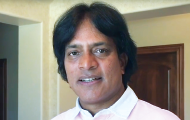Achutha Reddy, M.D., a Wichita, Kan., psychiatrist died last month after allegedly being assaulted and stabbed multiple times with a knife by an individual later identified by police as one of his patients.
Reddy was the founder of Holistic Psychiatric Services (HPS) in Wichita. He was 57 years old and is survived by his wife and three children.
During a press briefing on September 14, Wichita Police Lt. Todd Ojile said Reddy was found the night before in an alley behind the HPS clinic with “multiple stab wounds.” He was pronounced dead at the scene by EMS, Ojile said during the press briefing that is posted on YouTube.
Later that evening police were called to the Wichita Country Club, where a man with blood on him had been spotted by a security guard sitting in a car. “During an investigation, we learned the 21-year-old suspect was a client of Dr. Reddy and had been at the office,” Ojile said. “He was in the [clinic] for a short time; he left and later came back…. After going into the office, a disturbance was heard. An office manager entered the office and observed the suspect assaulting Dr. Reddy. She attempted to stop the assault, which allowed Dr. Reddy to flee the office. The suspect then chased Dr. Reddy out of the [clinic] and caught up with him in the alley behind the [clinic], where we believe a second assault occurred.”
In 2006, psychiatrist Wayne Fenton, M.D., an associate director of the National Institute of Mental Health and an internationally known expert on schizophrenia, was murdered by a patient in Fenton’s private office. Studies of violence by patients on hospital inpatient wards indicate a significantly higher risk for psychiatrists and other mental health staff of being the victim of violence than for other occupations (
Psychiatric News, December 30, 2016). Violent assaults by outpatients would seem to be much rarer, but psychiatrists are nevertheless advised to take precautions when meeting with patients who may be at risk for being violent (see box).
Kansas Psychiatric Society (KPS) President Matthew Macaluso, D.O., in a statement released by KPS, expressed condolences to Reddy’s family and urged the public and media to keep the event in perspective.
“We are saddened and distressed by the untimely passing of our colleague, Wichita psychiatrist Dr. Achutha Reddy,” Macaluso said. “His passing is made more tragic since it reportedly occurred at the hands of a patient.
“KPS condemns all acts of violence and supports our local law enforcement, who are gathering information related to this devastating event. It is also important that the community not generalize this act to all persons with mental illness, because most individuals with mental illness are of no greater risk of violent crime than the general population.”
In comments to Psychiatric News, Macaluso said Reddy was held in high regard by his fellow psychiatrists and admired and loved in the wider community in Wichita.
“He had an interest in holistic health care that certainly included the traditional practice of psychiatry but also focused on spiritual issues in patients’ lives,” Macaluso said. “He was well known and respected in the community. I attended his memorial service and was touched by the hundreds of people who were there. People who spoke at the service agreed this was a kind and gentle individual who went out of his way to help patients and often treated very difficult patients, encouraging a healthy lifestyle that incorporated spirituality.”
According to a flyer prepared by the family for the memorial service, Reddy was born in Suryapet, India, and attended medical school at Osmania Medical College in India. He immigrated to the United States shortly after marrying in 1991.
Reddy lived in St. Louis and later moved to Wichita, where he completed his residency in psychiatry at the University of Kansas. In 2002, he founded HPS. Its website says that services include “psychiatric medication evaluation and treatment that may include yoga and meditation; office-based opioid use disorder treatment including suboxone; individual therapy sessions; and crisis and emergency appointments.”
The flyer at Reddy’s memorial service stated, “Achutha has helped countless people in his community through a combination of his psychiatric and physical exercise therapies. His goal was always to make people happy and to convince everyone of the health benefits of running.” ■
APA’s “Resource Document on Psychiatric Violence Risk Assessment” can be accessed
here. The police briefing by Wichita police can be viewed
here.

